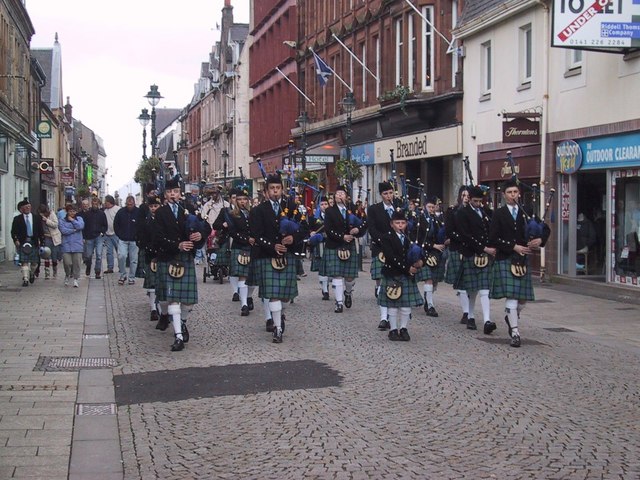
Fort William, Scotland
Fort William[a] is a town in Lochaber in the Scottish Highlands, located on the eastern shore of Loch Linnhe. At the 2011 census, Fort William had a population of 10,459, making it the second-largest settlement both in the Highland council area and in the whole of the Scottish Highlands; only the city of Inverness has a larger population.[5]
Fort William- Scottish Gaelic: An Gearasdan
- Scots: The Fort[1]
- Scottish Gaelic: An Gearasdan
- Scots: The Fort[1]
Fort William is a major tourist centre on the Road to the Isles, with Glen Coe just to the south, Ben Nevis and Aonach Mòr to the east, and Glenfinnan to the west. It is a centre for hillwalking and climbing due to its proximity to Ben Nevis and many other Munros. It is also known for its nearby downhill mountain bike track. It is the start/end of both the West Highland Way (Milngavie – Fort William) and the Great Glen Way (a walk/cycleway, Fort William – Inverness).
Around 726 people (7.33% of the population) can speak Gaelic.[6]
Origins[edit]
The earliest recorded settlement on the site is a Cromwellian wooden fort built in 1654 as a base for the New Model Army to "pacify" Clan Cameron after the Wars of the Three Kingdoms.[7] The post-1688 revolution fort was named Fort William after William of Orange, who ordered that it be built to control some of the Scottish clans.[8] The settlement that grew around it was called Maryburgh, after his wife Mary II of England. This settlement was later renamed Gordonsburgh, and then Duncansburgh before being renamed Fort William, this time after Prince William, Duke of Cumberland.[9] There have been various suggestions over the years to rename the town (for example, to Invernevis).[10]
The origin of the Gaelic name for Fort William, An Gearasdan, is not recorded but could be a loanword from the English garrison, having entered common usage some time after the royal garrison was established, during the reign of William of Orange or perhaps after the earlier Cromwellian fort.[11]
Festivals[edit]
In a celebration of mountains and the culture that surrounds them, and in recognition of the importance of climbing and walking tourism to the town, the Fort William Mountain Festival is held there each year. For a number of years, this volunteer-led festival has concentrated mostly around film but, starting in the Year of Highland Culture – Highland 2007, its scope was widened, and it dropped the word 'film' from its title.[30]
Education[edit]
Lochaber High School is the local high school and serves a large catchment area which includes the surrounding villages. West Highland College is part of the University of the Highlands & Islands. It hosts the School of Adventure Studies (SOAS) offering both FE courses & HE honours degrees.